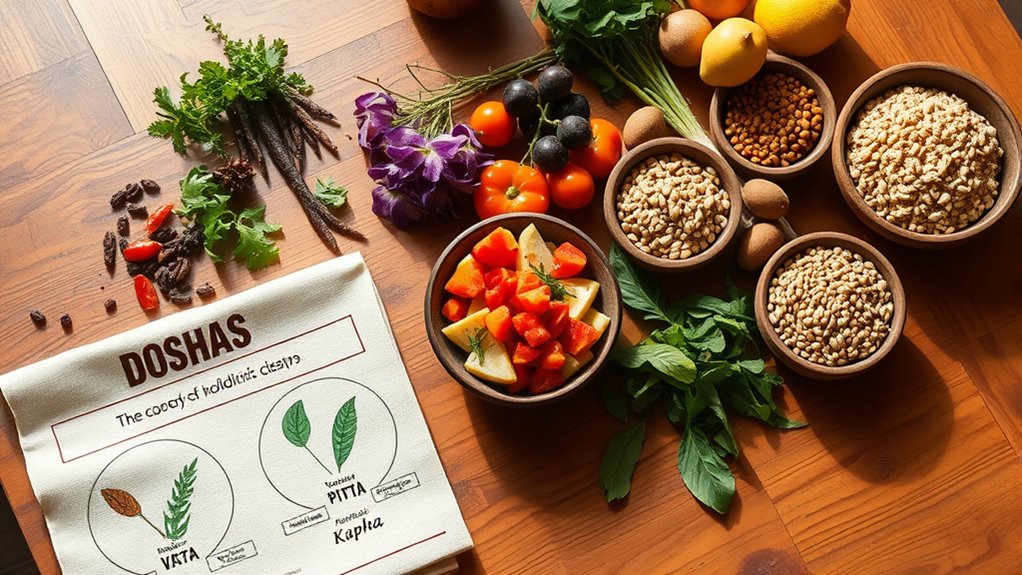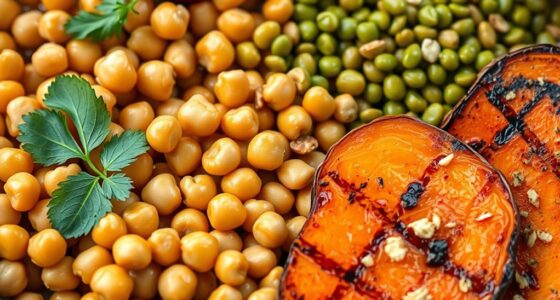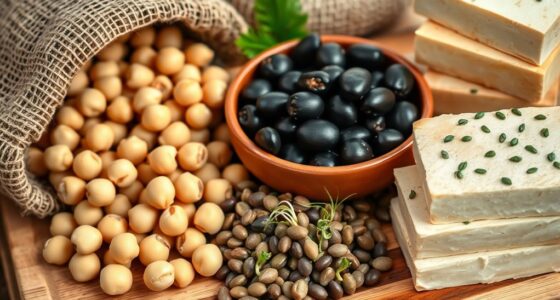Discover your unique Ayurveda dosha—Vata, Pitta, or Kapha—and learn how it influences your health and energy. Each dosha has specific traits and imbalances that can be balanced with tailored diet and lifestyle choices. Incorporate foods, herbs, and routines suited to your dominant dosha to improve digestion, mental clarity, and emotional stability. Keep exploring to find personalized tips that help maintain harmony and wellness in your daily life.
Key Takeaways
- Ayurveda identifies three primary doshas—Vata, Pitta, Kapha—that influence body functions and overall health.
- Balancing doshas through tailored diet and lifestyle promotes physical and mental well-being.
- Vata benefits from warm, grounding foods; Pitta from cooling, soothing foods; Kapha from light, spicy foods.
- Recognizing dosha imbalances helps customize routines, herbal remedies, and dietary choices to maintain harmony.
- Incorporating dosha-specific practices supports digestion, mental clarity, and emotional stability for optimal health.
Understanding the Concept of Doshas in Ayurveda
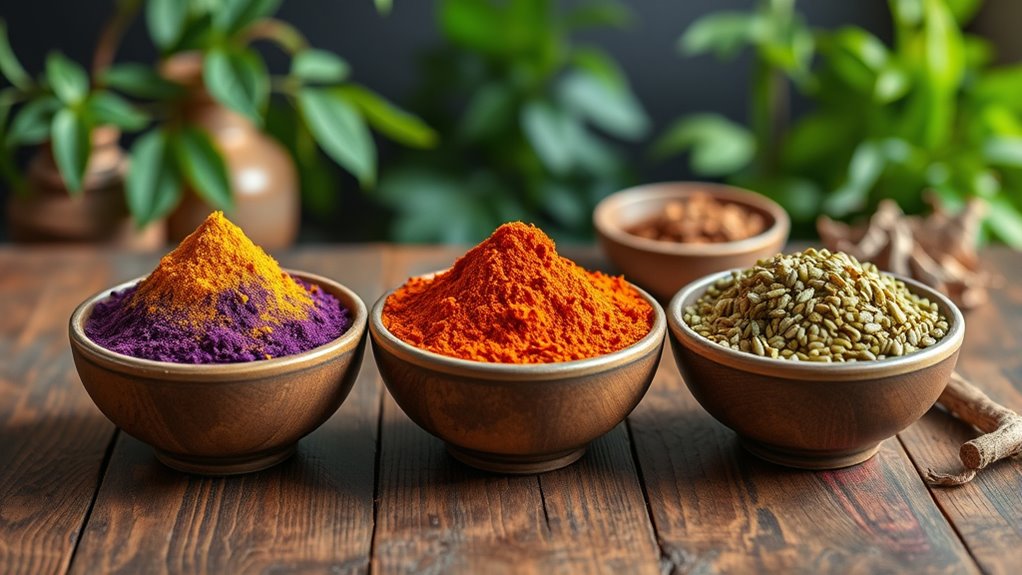
In Ayurveda, doshas are the fundamental energies that govern your body’s functions and balance. They are unique combinations of the five elements—earth, water, fire, air, and space—that influence your physical and mental well-being. Achieving dosha balance is essential for maintaining good health and mental clarity. When your doshas are in harmony, your mind stays sharp, and your body functions smoothly. Imbalances can lead to physical ailments and mental fog, affecting focus and emotional stability. Understanding your dominant dosha helps you tailor your diet and lifestyle to support overall health. By paying attention to your body’s signals, you can fine-tune your routines to keep your doshas balanced, promoting clarity of mind and well-being at its most suitable. Recognizing relationship patterns that impact your health can also guide you toward more holistic well-being.
The Characteristics of Vata Dosha
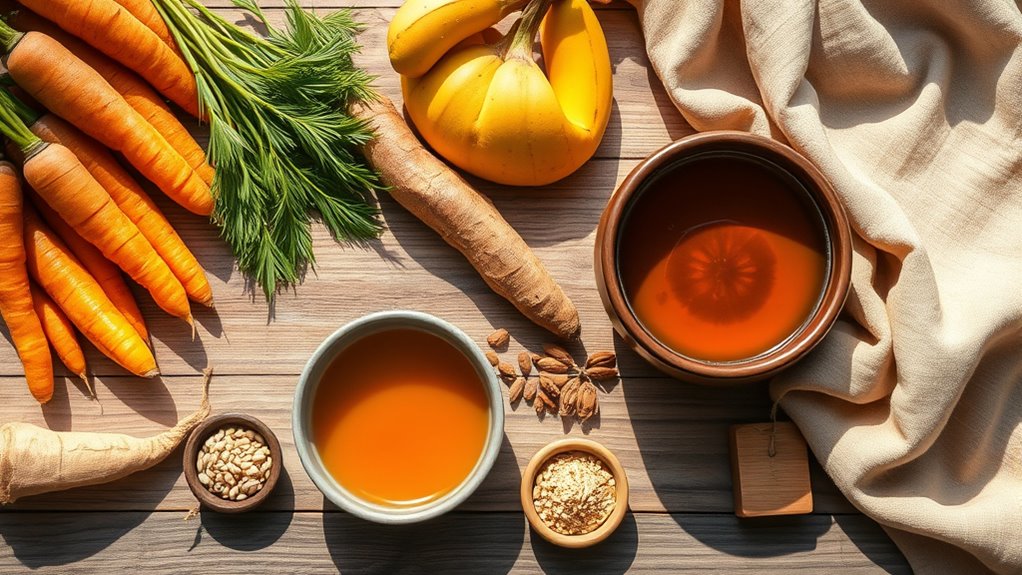
Vata dosha is characterized by qualities such as lightness, dryness, and mobility, which influence both your body and mind. When Vata dominates, you might experience irregular energy, anxiety, or dry skin. To balance Vata, explore Ayurvedic herbal remedies that promote stability and hydration. Incorporate Vata meditation techniques to calm your restless mind and foster grounding. Be mindful of your diet, favoring warm, moist, and nourishing foods to counteract dryness. Regular routines help soothe Vata’s unpredictable nature and support overall harmony.
Balance Vata with warm, moist foods, grounding meditation, and nourishing herbal remedies for overall harmony.
- Embrace warm herbal teas and oils
- Practice grounding Vata meditation techniques
- Use Ayurvedic herbal remedies like Ashwagandha
- Follow a warm, moist diet
- Maintain consistent daily routines
The Traits of Pitta Dosha
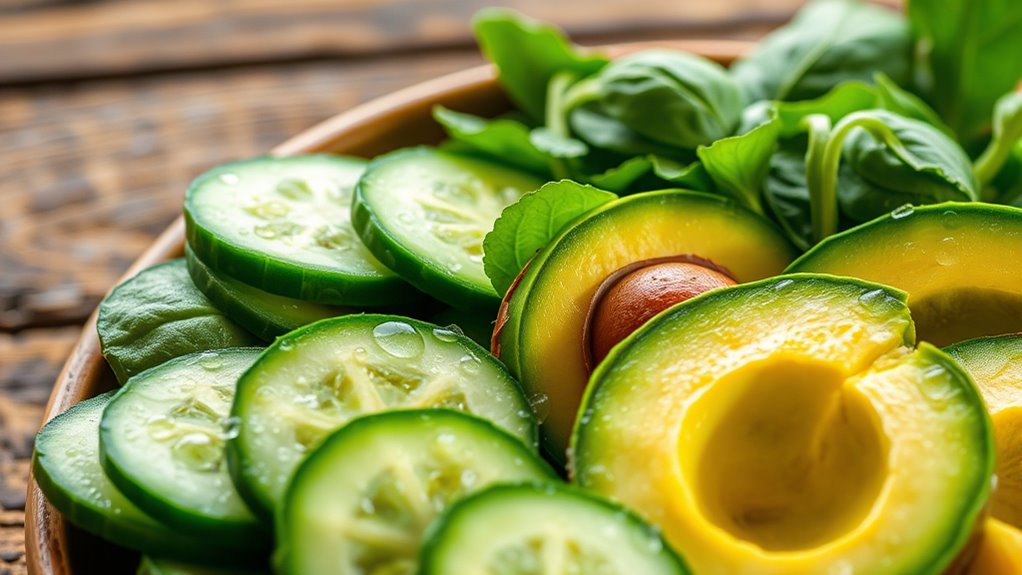
Pitta dosha is primarily made up of fire and water, giving it a hot and intense nature. You’ll notice traits like sharpness, focus, and a strong drive, but these can also lead to irritability or inflammation if out of balance. Factors like spicy foods, excessive heat, and stress tend to aggravate Pitta, so managing these helps keep it balanced. Additionally, understanding best anime movies can provide a relaxing escape to help soothe Pitta imbalances.
Pitta’s Elemental Composition
Pitta’s elemental composition reflects its fiery and transformative nature, primarily encompassing the elements of fire and water. This combination influences Pitta’s traits, such as sharpness, intensity, and metabolism. Maintaining the elemental balance is key to supporting a healthy dosha classification and overall well-being. When out of balance, Pitta can lead to inflammation, acidity, and irritability. To understand Pitta’s traits, consider these core aspects:
- Fire governs digestion and transformation processes
- Water provides fluidity and lubrication
- The fiery element fuels heat and intensity
- Water moderates fire’s sharpness
- The elemental balance influences Pitta’s temperament and health
- The integration of technology in healthcare can further support the management of Pitta imbalances and promote holistic well-being.
Typical Pitta Traits
Because of its fiery nature, Pitta dosha is characterized by traits that reflect sharpness, intensity, and a strong metabolism. You might notice a focused mind, a competitive streak, and a drive for success. Pitta influences your digestion, often giving you a quick appetite and strong digestion. Your body tends to be medium build, with warm skin and a tendency to sweat easily. The mind-body connection is strong, so emotional traits like anger, irritability, or impatience can surface if Pitta is out of balance. To maintain dosha balance, you should practice dosha balance techniques such as cooling foods, calming activities, and mindfulness exercises. These help soothe Pitta’s fiery traits and support your overall well-being. Additionally, incorporating vetted newborn sunscreens into your routine can protect your delicate skin from UV rays, reflecting a gentle and mindful approach to health.
Pitta-Aggravating Factors
Certain lifestyle choices and environmental factors can easily aggravate Pitta dosha, intensifying its fiery qualities. To keep Pitta balanced, avoid behaviors that increase heat and intensity. Exposure to hot weather, spicy foods, alcohol, and caffeine can all worsen Pitta. Overworking yourself or neglecting rest also elevates Pitta’s fiery nature. Incorporate calming meditation techniques to soothe agitation and practice herbal remedies known for cooling properties. Staying hydrated and choosing cooling, bland foods help reduce Pitta’s excess heat. Additionally, avoid excessive sun exposure and stressful situations that trigger Pitta’s fiery traits. Being mindful of these factors helps maintain balance and prevents Pitta from becoming too aggravated, supporting overall well-being and harmony in your dosha.
Features of Kapha Dosha
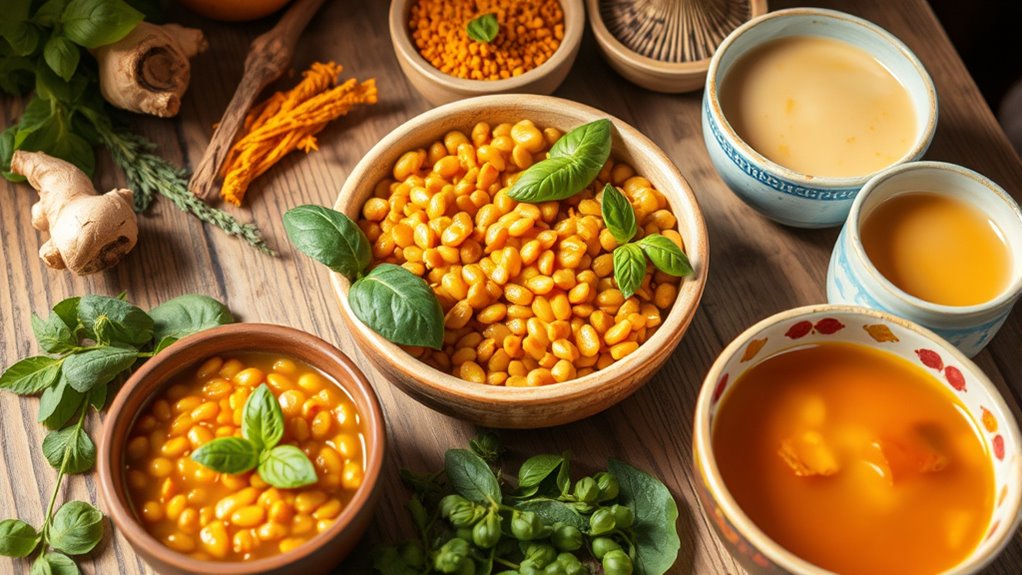
Kapha dosha is characterized by qualities like heaviness, sluggishness, and stability, which influence both your physical and mental traits. You might notice a solid build, strong bones, and smooth, moist skin. Your natural tendency might lean toward calmness and steadiness, but excess Kapha can lead to sluggishness and weight gain. To balance this dosha, herbal remedies like ginger and turmeric can stimulate digestion and energy. Your physical characteristics often include a slow metabolism and a tendency to retain water. You may also have thick hair and a tendency toward congestion or mucus buildup. Recognizing these features helps you understand your body’s needs and how to incorporate herbs and dietary changes to maintain harmony. Additionally, paying attention to lifestyle habits can help prevent excess buildup of Kapha and promote better health.
Identifying Your Dominant Dosha
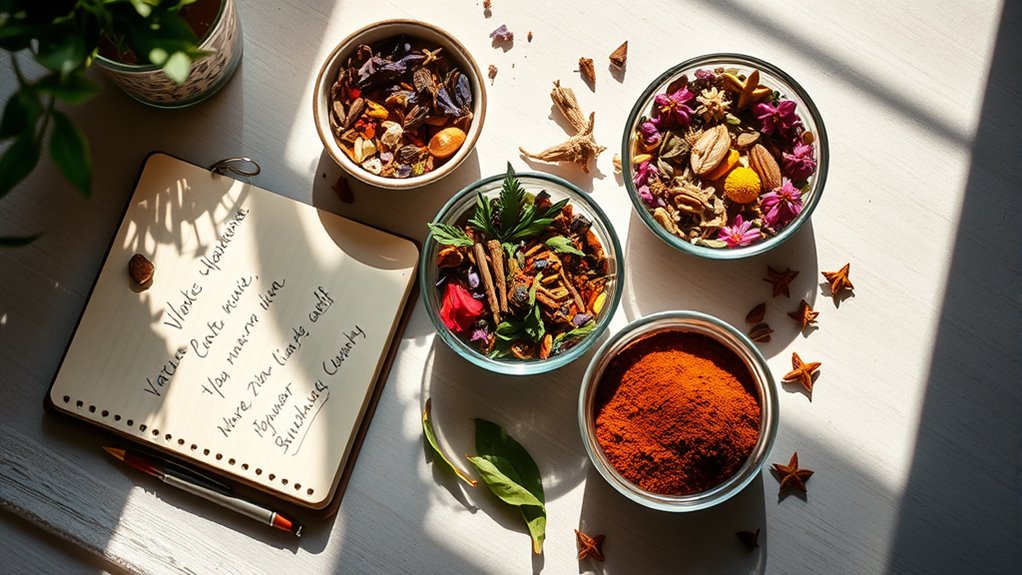
To identify your dominant dosha, observe your physical traits, mental tendencies, and how your body responds to different foods and environments. Recognizing these signs helps you achieve dosha balance and develop a personalized diet. Focus on key indicators like energy levels, digestion, and emotional patterns. Be mindful of your cookie preferences, as your browsing habits may influence the recommendations you receive. Pay attention to your digestion and appetite patterns. Observe your sleep quality and mental clarity. Identify if you tend to be anxious, calm, or easily irritated. Track your body’s reaction to spicy, sweet, or bitter foods.
Dietary Guidelines for Vata Types
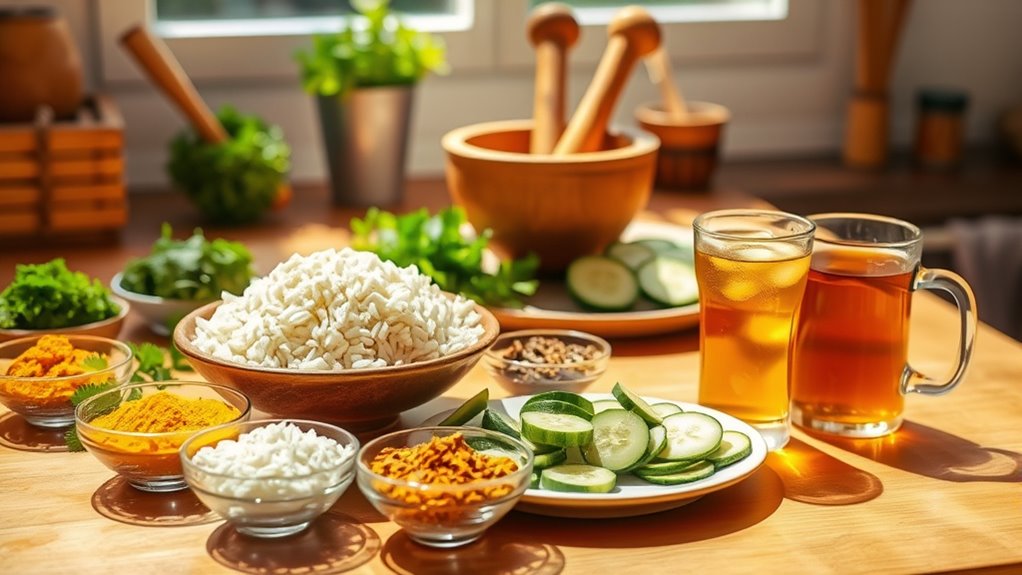
If you have a Vata constitution, focusing on grounding and warming foods can help balance your energetic and variable nature. Emphasize cooked grains, root vegetables, warm spices, and healthy fats to stabilize your energy. Incorporate herbal remedies like ashwagandha or ginger to soothe excess Vata. Regular meditation techniques can also calm your restless mind and promote stability. Avoid cold, dry, or raw foods that aggravate Vata’s airy qualities. Instead, opt for warm, moist, and nourishing meals that nurture your body and mind. Using proper nutrition is essential for maintaining balance and preventing fatigue associated with Vata imbalances. Use the table below to visualize key dietary choices:
| Nourishing Foods | Avoidance Tips |
|---|---|
| Cooked grains | Raw vegetables |
| Root vegetables | Cold drinks |
| Warm spices | Dry snacks |
| Healthy fats | Caffeine |
| Herbal remedies | Excessive exercise |
Dietary Tips for Pitta Types
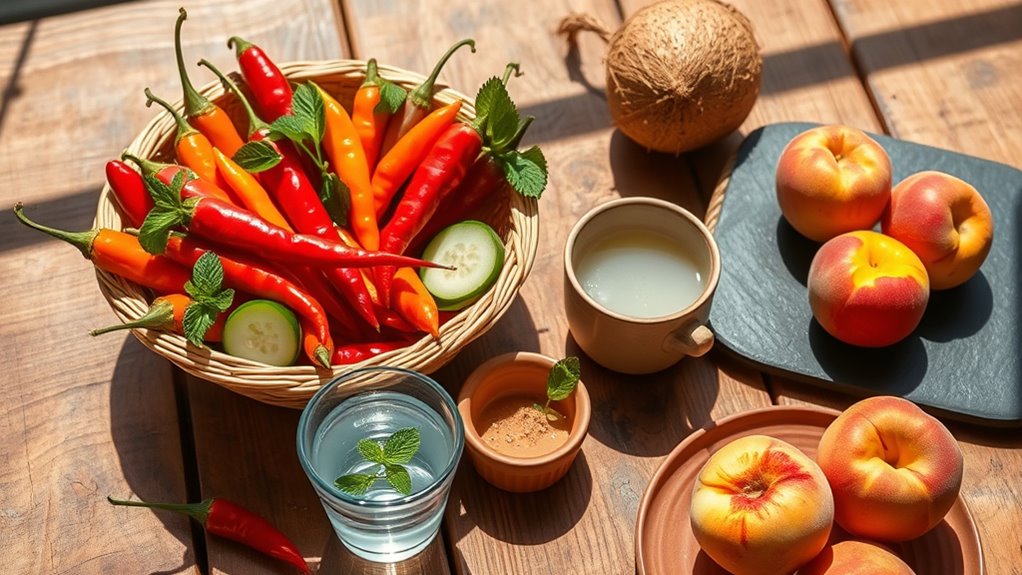
Since Pitta types tend to have a fiery and intense nature, choosing cooling and soothing foods can help prevent overheating and irritation. Incorporate foods like cucumbers, melons, and leafy greens to balance your internal heat. Opt for sweet, bitter, and astringent tastes to pacify Pitta. Herbal remedies such as coriander and fennel teas can provide cooling effects, while meditation techniques help manage stress and temper fiery tendencies. Avoid spicy, fried, and acidic foods that aggravate Pitta. Instead, focus on gentle, nourishing meals that promote calmness and balance. Incorporating natural cooling properties found in certain foods and herbs can further enhance Pitta pacification. Remember, moderation is key—don’t overeat or consume overly hot beverages. By following these dietary tips, you’ll support your natural harmony and maintain a peaceful, healthy Pitta constitution.
Food Recommendations for Kapha Types
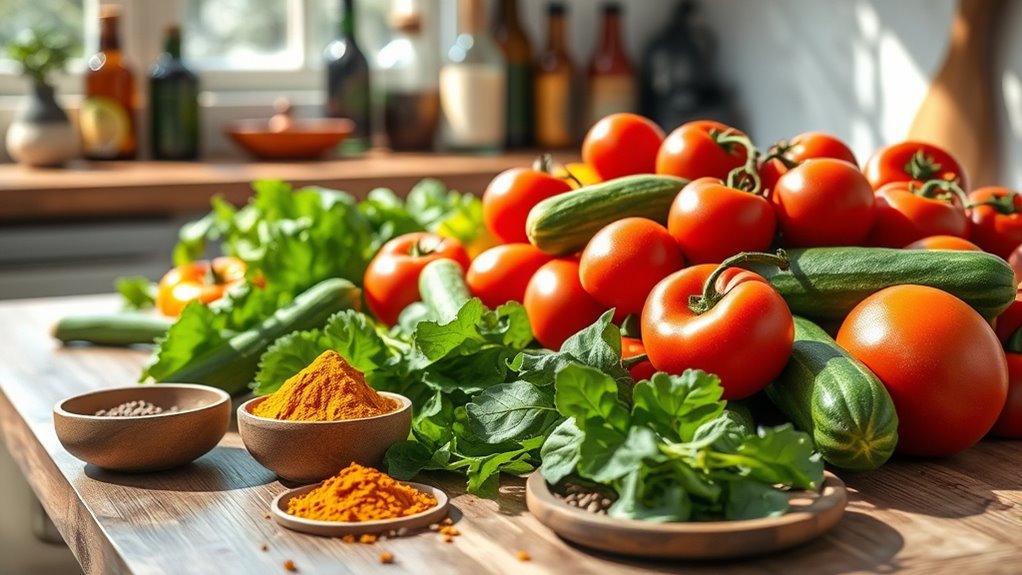
As a Kapha type, you should focus on light, warm meals that boost your energy. Try to limit heavy, sweet foods that can increase sluggishness, and add stimulating spices to your dishes. These adjustments help balance your dosha and keep you feeling more vibrant. Incorporating appropriate food choices can further support your overall well-being.
Favor Light, Warm Meals
To balance the heavy and sluggish tendencies of Kapha, focus on incorporating light, warm meals into your diet. These meals help stimulate digestion and increase energy. Choose foods that are cooked, spicy, and mildly drying to offset Kapha’s damp qualities. Incorporate herbs and spices like ginger, black pepper, and cumin to boost metabolism. Additionally, practicing meditation techniques can support digestion and mental clarity. Using herbal remedies such as ginger tea or turmeric can further enhance these effects. Be mindful of portion sizes and avoid heavy, oily foods. By prioritizing light, warm meals, you’ll naturally reduce sluggishness and promote a balanced Kapha constitution. Incorporating hot tools like hot rollers can also help style your hair in a way that complements your energetic balance.
- Warm soups and stews with spices
- Steamed vegetables with ginger
- Light grains like quinoa or barley
- Herbal teas like ginger or cinnamon
- Spiced lentil or bean dishes
Limit Heavy, Sweet Foods
Are heavy, sweet foods causing sluggishness in your Kapha balance? If so, it’s time to cut back on these foods to restore energy and harmony. Excess sweets and dense foods can increase Kapha, leading to lethargy and congestion. Instead, focus on lighter, warming meals that stimulate digestion. Incorporate herbal remedies like ginger or turmeric to support detoxification and balance. Additionally, practicing meditation techniques can help you become more mindful of your eating habits and reduce cravings for heavy foods. These strategies encourage a more active metabolism and prevent Kapha from becoming sluggish. Remember, moderation is key—by limiting heavy, sweet foods and embracing lighter options, you support your overall well-being and maintain a healthy dosha balance.
Emphasize Stimulating Spices
Stimulating spices play a essential role in balancing Kapha by invigorating digestion and boosting energy. Incorporating spicy flavor and aromatic herbs helps reduce sluggishness and clears excess mucus. These spices create warmth and stimulate your digestive fire, preventing Kapha buildup. To energize your diet, try adding a pinch of cumin, ginger, black pepper, turmeric, or cinnamon. These aromatic herbs not only enhance flavor but also support circulation and metabolism. Using these spices in your meals can make a noticeable difference in how you feel, keeping Kapha in check. Remember, moderation is key—overdoing spicy flavors can cause discomfort. Emphasize these invigorating spices to maintain balance, boost vitality, and keep your digestion lively.
Incorporating Dosha-Specific Practices Into Your Routine

Incorporating dosha-specific practices into your routine can substantially enhance your overall well-being by aligning your daily habits with your unique constitution. To do this, start by adopting meditation techniques that suit your dosha—such as calming practices for Pitta or energizing ones for Vata. Incorporate herbal remedies tailored to balance your specific dosha, like Ashwagandha for Vata or Tulsi for Kapha. Consistent practice helps regulate your mind and body, promoting harmony. Additionally, adjusting your routines—like meal times, exercise, and sleep—supports your dosha’s needs. By customizing your habits with these practices, you foster better digestion, mental clarity, and emotional stability. Ultimately, integrating dosha-specific routines creates a balanced lifestyle that sustains your health and essentiality.
Frequently Asked Questions
How Do Doshas Influence Mental Health and Emotional Well-Being?
Your doshas considerably influence your mental health and emotional well-being by shaping your mind-body connection. When your doshas are balanced, you feel more resilient emotionally and mentally, able to handle stress better. Imbalances, however, can lead to mood swings, anxiety, or depression. By understanding and maintaining your dosha balance through lifestyle and diet, you enhance your emotional resilience, fostering a healthier, more harmonious state of mind and body.
Can Your Dosha Change Over Time or With Lifestyle Adjustments?
Think of your dosha as a river flowing gently, sometimes shifting course with the seasons. Yes, your dosha can fluctuate over time, especially with lifestyle modifications. You might notice subtle changes as your habits, diet, and environment influence your energy balance. These dosha fluctuations reflect your body’s natural adaptability, showing that with mindful adjustments, you can help restore harmony and maintain ideal health throughout life’s changing currents.
Are There Specific Herbs That Balance Each Dosha Effectively?
You’re curious about specific herbs for dosha balancing, and the answer is yes. Herbal remedies can effectively support each dosha by promoting harmony within your body. For Vata, try calming herbs like Ashwagandha; for Pitta, cooling herbs such as Aloe Vera work well. Kapha benefits from stimulating herbs like Ginger. Incorporating these herbs into your routine can enhance dosha balancing and improve overall well-being.
How Does Ayurveda Address Common Modern Health Issues With Doshas?
Think of your health as a garden that needs tending. Ayurveda addresses modern health issues by balancing your doshas through holistic healing and tailored lifestyle modifications. When stress or fatigue strike, understanding your dosha helps you make smarter choices—like adjusting diet or routines—that restore harmony. This approach not only alleviates symptoms but nurtures overall well-being, turning your daily habits into powerful tools for health.
What Are the Signs of a Dosha Imbalance Needing Correction?
When your dosha is imbalanced, you notice signs like dosha stress and imbalance symptoms such as fatigue, digestive issues, or irritability. You might feel restless if Vata is out of balance, overly sluggish if Kapha dominates, or anxious if Pitta is increased. Recognizing these signs helps you take action to restore harmony, like adjusting your diet, lifestyle, or incorporating calming practices to correct the imbalance symptoms.
Conclusion
By understanding your dosha, you unlock the key to balancing your body like a finely tuned instrument. Embrace the tailored diet and practices that resonate with your unique nature, and watch your health blossom like a garden in full bloom. Remember, Ayurveda guides you to harmony within—when you nurture your dosha, you create a symphony of well-being that echoes through every aspect of your life.
